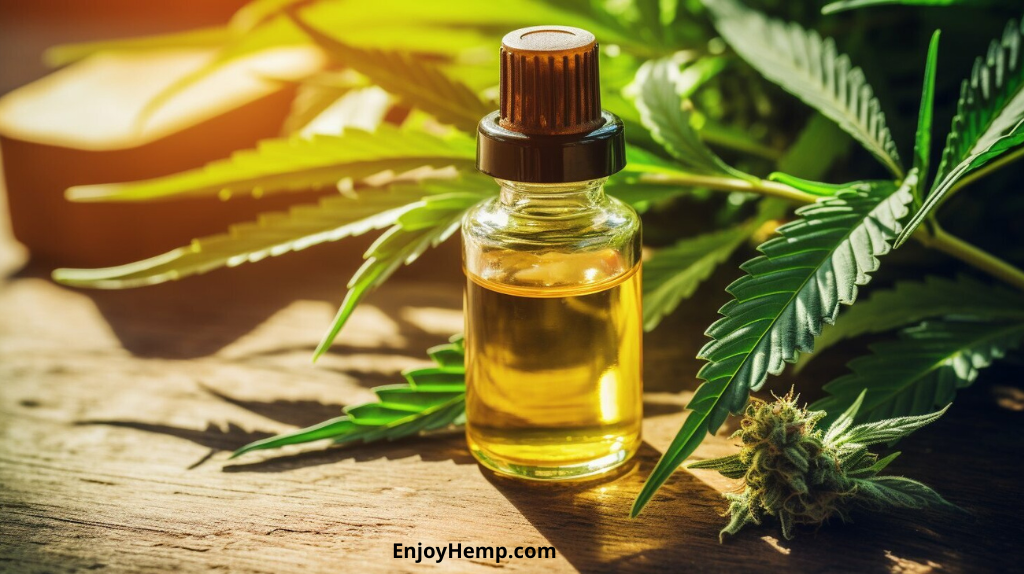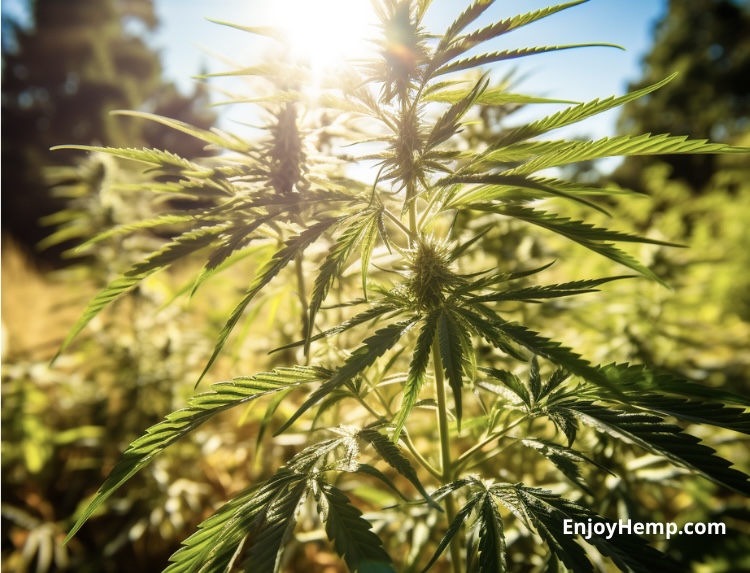Hemp and CBD are frequently confused terms, but they are not the same thing. Understanding the differences between hemp and CBD is crucial for anyone looking to explore their unique properties.

Key Takeaways:
- Hemp and CBD are derived from the same Cannabis sativa plant but have different compositions and legal statuses.
- Hemp refers to cannabis with less than 0.3% THC, while marijuana contains higher levels of THC and is still classified as cannabis.
- CBD is a non-intoxicating compound found in cannabis, with hemp plants generally containing more CBD and marijuana plants containing more THC.
- CBD products made from hemp are legal across most of the U.S., while those made from marijuana are still federally illegal.
- The benefits and side effects of CBD do not depend on whether it comes from hemp or marijuana.
- Consumers should be aware of the differences between CBD oil and hemp oil, as they are derived from different parts of the plant and have different purposes.
What is Hemp?
Hemp is a term used to describe cannabis plants that contain less than 0.3% THC. It is a versatile plant with a variety of uses, including the production of hempseed oil.
Hemp plants have been cultivated for thousands of years for their fibers, which have been used to make textiles, paper, and construction materials. The seeds of the hemp plant are also highly nutritious and can be ground into hempseed oil, which is rich in omega-3 and omega-6 fatty acids.
Aside from its industrial and nutritional uses, hemp is also gaining attention for its potential environmental benefits. Hemp plants are known for their ability to absorb carbon dioxide from the atmosphere and enrich the soil, making them a sustainable crop choice.
| Hemp Plant | Description |
|---|---|
| THC Content | Less than 0.3% |
| Main Uses | Textiles, paper, construction materials, hempseed oil |
| Environmental Benefits | Carbon dioxide absorption, soil enrichment |
In summary, hemp is a cannabis plant with low THC content that is cultivated for its fibers, seeds, and environmental benefits. Its uses range from industrial applications to nutritional supplements, making it a valuable and versatile plant.
What is CBD?
CBD, short for cannabidiol, is a compound found in cannabis that does not produce intoxicating effects. It has gained popularity for its potential health benefits and can be found in a variety of products. CBD is one of many cannabinoids found in the cannabis plant, along with THC.
Unlike THC, which is known for its psychoactive properties, CBD does not cause a “high” sensation. This makes it an appealing option for those seeking the potential benefits of cannabis without the mind-altering effects. In fact, CBD may even counteract some of the intoxicating effects of THC.
CBD is believed to interact with the body’s endocannabinoid system, which plays a role in regulating various physiological functions, such as pain perception, mood, and sleep. Research suggests that CBD may have anti-inflammatory, analgesic, and neuroprotective properties. It is being studied for its potential therapeutic applications in conditions such as chronic pain, anxiety, epilepsy, and more.
With the growing interest in CBD, consumers can now find a wide range of CBD products on the market. These include oils, tinctures, capsules, edibles, topicals, and more. It is important to note that the effects and dosage of CBD may vary depending on the individual and the specific product. Consulting with a healthcare professional before using CBD is recommended.
Differences Between Hemp and Marijuana
One of the main differences between hemp and marijuana lies in their THC content. While hemp contains low levels of THC, marijuana is classified as cannabis due to its higher THC levels. THC, or tetrahydrocannabinol, is the psychoactive compound responsible for the “high” associated with marijuana use. Hemp, on the other hand, contains less than 0.3% THC, making it non-intoxicating and suitable for various purposes.

Another difference between hemp and marijuana is their legal status. Hemp has been legalized in the United States and is recognized as an agricultural commodity. It can be cultivated for various purposes, such as the production of hempseed oil, fiber, and CBD products. Marijuana, on the other hand, remains federally illegal, although some states have legalized it for medicinal or recreational use.
When it comes to their composition, hemp plants generally contain higher levels of CBD (cannabidiol), another compound found in cannabis. CBD is known for its potential health benefits and is commonly used in various products, including oils, tinctures, and topicals. Marijuana plants, on the other hand, contain higher levels of THC, which gives it its psychoactive properties.
| Hemp | Marijuana | |
|---|---|---|
| THC Content | Less than 0.3% | Higher levels, typically above 0.3% |
| Legal Status | Legal in most states, recognized as an agricultural commodity | Federally illegal, legalized for medicinal or recreational use in some states |
| CBD Content | Higher levels | Lower levels |
It is important for consumers to understand these differences when choosing CBD products. CBD products derived from hemp are legal across most of the U.S. and are widely available. On the other hand, CBD products derived from marijuana are only legal in states where marijuana is legalized. By knowing the source of CBD, consumers can make informed decisions and ensure they are using products that meet their needs.
Legal Status of Hemp and CBD
The legal status of hemp and CBD varies in the United States, with CBD products derived from hemp being legal in most states, while those derived from marijuana are still federally illegal. This discrepancy arises from the difference in THC content between the two. Hemp, defined as cannabis with less than 0.3% THC, falls under different regulations than marijuana, which contains higher levels of THC and is still classified as cannabis.
Table 1 provides a comparison of the legal status of hemp and CBD, highlighting the variations across states:
| State | Hemp CBD Legal | Marijuana CBD Legal |
|---|---|---|
| Alabama | ✅ | ❌ |
| California | ✅ | ✅ |
| Texas | ✅ | ❌ |
| New York | ✅ | ✅ |
Quote: “While CBD products derived from hemp are legal in most states, it is important to note that the legal status of CBD can still vary across the country. It is advisable to research and understand the specific laws and regulations of your state before purchasing or using any CBD products.”
To ensure compliance with the legal framework, consumers should be aware of the differences between CBD oil and hemp oil. CBD oil is derived from the flowers, leaves, and stalks of the hemp or marijuana plant, while hemp oil is extracted from the seeds. CBD oil is often used for its potential health benefits, while hemp oil is commonly used as a cooking oil or supplement. Understanding these distinctions will help individuals make informed decisions when purchasing and using CBD products.
Understanding CBD Oil and Hemp Oil
It’s important to understand the differences between CBD oil and hemp oil, as they are derived from different parts of the cannabis plant and have distinct purposes.
CBD oil is extracted from the flowers, leaves, and stalks of the hemp plant. It contains high levels of cannabidiol (CBD) and only trace amounts of THC, the psychoactive compound found in marijuana. CBD oil is known for its potential therapeutic benefits and has gained popularity for its use in managing various conditions, including pain, anxiety, and epilepsy.
On the other hand, hemp oil, also known as hempseed oil, is derived from the seeds of the hemp plant. It does not contain CBD or THC but is rich in omega fatty acids, vitamins, and minerals. Hemp oil is commonly used in cooking, skincare products, and as a nutritional supplement.
The differences between CBD oil and hemp oil can be summarized as follows:
- Composition: CBD oil contains high levels of CBD and minimal THC, while hemp oil does not contain CBD or THC.
- Source: CBD oil is extracted from the flowers, leaves, and stalks of the hemp plant, while hemp oil is derived from the seeds.
- Purpose: CBD oil is primarily used for its potential therapeutic benefits, while hemp oil is commonly used in cooking and as a nutritional supplement.
| CBD Oil | Hemp Oil |
|---|---|
| Contains CBD and trace amounts of THC | Does not contain CBD or THC |
| Extracted from flowers, leaves, and stalks of the hemp plant | Derived from the seeds of the hemp plant |
| Used for therapeutic purposes | Used in cooking and as a nutritional supplement |
Understanding the differences between CBD oil and hemp oil is essential for consumers looking to incorporate cannabis-derived products into their wellness routine. Whether you’re seeking potential therapeutic benefits or nutritional support, make sure to choose the product that aligns with your specific needs.
By knowing the distinctions between CBD oil and hemp oil, you can make informed decisions when selecting the right product for your needs. Whether it’s exploring the potential therapeutic benefits of CBD oil or incorporating the nutritional value of hemp oil into your diet, understanding these differences ensures you find the right product to enhance your well-being.
Benefits and Side Effects of CBD
CBD has been associated with various potential benefits and side effects, regardless of whether it is derived from hemp or marijuana. It is important for consumers to understand these potential effects when considering the use of CBD products.
One of the main benefits of CBD is its potential to provide relief from pain and inflammation. Studies have shown that CBD can interact with receptors in the body’s endocannabinoid system, which is responsible for regulating pain and inflammation. This interaction may help alleviate symptoms associated with conditions such as arthritis, multiple sclerosis, and chronic pain.
In addition to pain relief, CBD has also shown promise in reducing anxiety and depression. Research suggests that CBD can affect the brain’s receptors for serotonin, a neurotransmitter that plays a key role in regulating mood and social behavior. By influencing serotonin levels, CBD may help reduce symptoms of anxiety and depression.
While CBD offers potential benefits, it is important to note that it may also have side effects. Common side effects of CBD include drowsiness, dry mouth, and changes in appetite. In some cases, CBD may also interact with certain medications, so it is advisable to consult with a healthcare professional before using CBD products, especially if you are currently taking any medications.
Summary:
- CBD has potential benefits for pain relief, inflammation, anxiety, and depression.
- Common side effects of CBD include drowsiness, dry mouth, and changes in appetite.
- Consultation with a healthcare professional is recommended before using CBD products, especially if taking medications.
| Potential Benefits | Side Effects |
|---|---|
| Pain relief | Drowsiness |
| Inflammation reduction | Dry mouth |
| Anxiety and depression reduction | Changes in appetite |
“CBD has shown potential in relieving pain, reducing inflammation, and alleviating symptoms of anxiety and depression.”
In conclusion, CBD has a range of potential benefits, including pain relief, inflammation reduction, and anxiety and depression reduction. However, it is important to be aware of the potential side effects and consult with a healthcare professional before using CBD products. Whether derived from hemp or marijuana, CBD can offer relief for many individuals, but it is crucial to make informed decisions and closely monitor any changes in your condition when using CBD.
Using CBD Products
Using CBD products can offer potential health benefits, but it’s important to be aware of the legality and source of CBD, especially when considering products derived from hemp or marijuana. CBD, or cannabidiol, is a non-intoxicating compound found in cannabis. While hemp plants generally contain more CBD, marijuana plants contain more THC, the psychoactive compound responsible for the “high” sensation.
When it comes to CBD products, legality is a crucial factor to consider. CBD products derived from hemp are legal across most of the United States, thanks to the passing of the 2018 Farm Bill. However, it’s important to check the specific regulations in your state as laws may vary. On the other hand, CBD products derived from marijuana are still federally illegal, even if marijuana is legal for medical or recreational use in your state.
In addition to legality, understanding the source of CBD is essential. CBD oil and hemp oil are often used interchangeably, but they are derived from different parts of the cannabis plant and serve different purposes. CBD oil is extracted from the flowers, leaves, and stalks of the hemp plant, while hemp oil is derived from the seeds. CBD oil is commonly used for its potential therapeutic effects, while hemp oil is often used as a dietary supplement due to its high levels of omega-3 and omega-6 fatty acids.
Health Benefits of Using CBD Products
- Relief from chronic pain and inflammation
- Reduced anxiety and stress
- Improved sleep quality
- Alleviation of symptoms related to epilepsy and seizures
It’s important to note that the benefits and side effects of CBD do not depend on whether it comes from hemp or marijuana. However, it’s crucial to purchase CBD products from reputable sources that provide third-party lab testing to ensure quality and safety. Consulting with a healthcare professional is also recommended to determine the appropriate dosage and to discuss any potential interactions with current medications.
| Product Type | Source | Main Features |
|---|---|---|
| CBD Oil | From flowers, leaves, and stalks of the hemp plant | Potential therapeutic effects |
| Hemp Oil | From the seeds of the hemp plant | Rich in omega-3 and omega-6 fatty acids |
“Using CBD products can offer potential health benefits, but it’s crucial to be informed about the legality and source of CBD. Whether you choose CBD oil or hemp oil, always prioritize quality and safety for your well-being.”
Conclusion
In conclusion, hemp and CBD are not the same, and it’s crucial to understand their differences in order to make informed decisions when using CBD products.
Factual data:
Hemp refers to cannabis with less than 0.3% THC, while marijuana contains more than 0.3% THC and is still classified as cannabis. CBD, or cannabidiol, is a non-intoxicating compound found in cannabis. Hemp plants generally contain more CBD, while marijuana plants contain more THC.
CBD products made from hemp are legal across most of the U.S., while those made from marijuana are still federally illegal.
The benefits and side effects of CBD do not depend on whether it comes from hemp or marijuana. Consumers should be aware of the differences between CBD oil and hemp oil, as they are derived from different parts of the plant and have different purposes.
By understanding these distinctions, consumers can confidently navigate the CBD market and choose the products that best suit their needs. Whether you’re seeking the potential benefits of CBD for wellness purposes or exploring its various applications, knowing the difference between hemp and CBD is essential.
As the industry continues to evolve, it’s essential to stay informed about the latest regulations and developments surrounding hemp and CBD. Research reputable sources, consult with professionals, and rely on trusted brands to ensure the quality and legality of the products you choose.
Remember, knowledge is power when it comes to hemp and CBD. Empower yourself with the understanding of their differences, legalities, and potential benefits to make confident and well-informed decisions in your CBD journey.
FAQ
Q: Are hemp and CBD the same?
A: No, hemp and CBD are not the same thing. While both are derived from the Cannabis sativa plant, they have different compositions and legal statuses.
Q: What is hemp?
A: Hemp refers to cannabis plants with less than 0.3% THC. It has various uses, including the production of hempseed oil.
Q: What is CBD?
A: CBD, or cannabidiol, is a non-intoxicating compound found in cannabis. It has potential health benefits and is used in various products.
Q: What are the differences between hemp and marijuana?
A: Hemp contains low levels of THC (less than 0.3%), while marijuana contains higher levels and is still classified as cannabis.
Q: What is the legal status of hemp and CBD?
A: CBD products derived from hemp are legal across most of the U.S., while those derived from marijuana remain federally illegal.
Q: What are the differences between CBD oil and hemp oil?
A: CBD oil and hemp oil are derived from different parts of the plant and have different purposes.
Q: Do the benefits and side effects of CBD depend on whether it comes from hemp or marijuana?
A: No, the benefits and side effects of CBD do not depend on whether it comes from hemp or marijuana.
Q: How should I use CBD products?
A: When using CBD products, it is important to consider their legality, potential health benefits, and the source of the CBD.

0 Comments